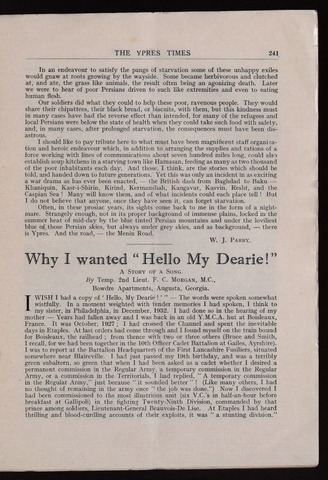Why I wanted Hello My Dearie!"
THE YPRES TIMES
241
In an endeavour to satisfy the pangs of starvation some of these unhappy exiles
would gnaw at roots growing by the wayside. Some became herbivorous and clutched
at, and ate, the grass like animals, the result often being an agonizing death. Later
we were to hear of poor Persians driven to such like extremities and even to eating
human flesh.
Our soldiers did what they could to help these poor, ravenous people. They would
share their chipattees, their black bread, or biscuits, with them, but this kindness must
in many cases have had the reverse effect than intended, for many of the refugees and
local Persians were below the state of health when they could take such food with safety,
and, in many cases, after prolonged starvation, the consequences must have been dis
astrous.
I should like to pay tribute here to what must have been magnificent staff organiza
tion and heroic endeavour which, in addition to arranging the supplies and rations of a
force working with lines of communications about seven hundred miles long, could also
establish soup kitchens in a starving town like Hamasan, feeding as many as two thousand
of the poor inhabitants each day. And those, I think, are the stories which should be
told, and handed down to future generations. Yet this was only an incident in as exciting
a war drama as has ever been enacted, the British dash from Baghdad to Baku
Khaniquin, Kasr-i-Shirin, Kirind, Kermanshah, Kangavar, Kasvin, Resht, and the
Caspian Sea Many will know them, and of what incidents could each place tell But
I do not believe that anyone, once they have seen it, can forget starvation.
Often, in these prosiac years, its sights come back to me in the form of a night
mare. Strangely enough, not in its proper background of immense plains, locked in the
summer heat of mid-day by the blue tinted Persian mountains and under the loviliest
blue of those Persian skies, but always under grey skies, and as background, there
is Ypres. And the road, the Menin Road.
W. J. Parrx.
A Story of a Song.
By Temp. 2nd Lieut. F. C. Morgan, M.C.,
Bowdre Apartments, Augusta, Georgia.
I WISH I had a copy of Hello, My Dearie I' The words were spoken somewhat
wistfully. In a moment weighted with tender memories I had spoken, I think to
my sister, in Philadelphia, in December, 1932. I had done so in the hearing of my
mother Years had fallen away and I was back in an old Y.M.C.A. hut at Boisleaux,
France. It was October, 1927 I had crossed the Channel and spent the inevitable
days in Etaples. At last orders had come through and I found myself on the train bound
for Boisleaux, the railhead from thence with two or three others (Bruce and Smith,
I recall, for we had been together in the 10th Officer Cadet Battalion at Gailes, Ayrshire).
I was to report at the Battalion Headquarters of the First Lancashire Fusiliers, situated
somewhere near Blaireville. I had just passed my 19th birthday, and was a terribly
green subaltern, so green that when I had been asked as a cadet whether I desired a
permanent commission in the Regular Army, a temporary commission in the Regular
Army, or a commission in the Territorials, I had replied, A temporary commission
in the Regular Army," just because it sounded better (Like many others, I had
no thought of remaining in the army once the job was done.") Now I discovered I
had been commissioned to the most illustrious unit (six V.C.'s in half-an-hour before
breakfast at Gallipoli) in the fighting Twenty-Ninth Division, commanded by that
prince among soldiers, Lieutenant-General Beauvois-De Lise. At Etaples I had heard
thrilling and blood-curdling accounts of their exploits, it was a stunting division."

